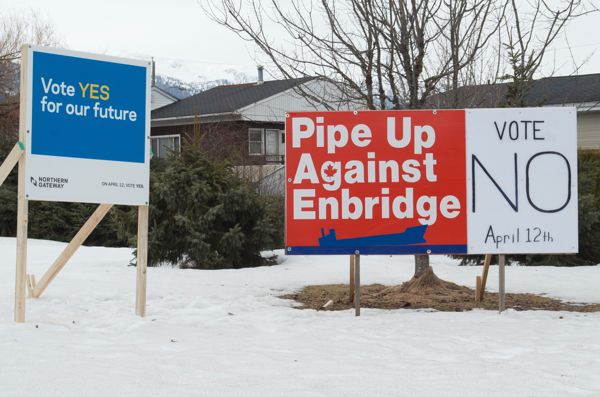[Editor's note: This story first appeared on DeSmog Canada and is republished here with permission.]
Kitimat residents are fighting back as Enbridge scales up its campaign to sway the town's plebiscite vote on the company's Northern Gateway oil pipeline, which would see oil loaded onto 225 tankers a year at a proposed Kitimat terminal.
Having already launched an advertising blitz, Enbridge now has teams of paid canvassers knocking on doors throughout the community of 9,000 people. Door-knockers include Ray Doering, Enbridge's manager of engineering from Calgary, Colin Kinsley, former mayor of Prince George and chair of the Enbridge-funded Northern Gateway Alliance, and other out-of-town Enbridge employees.
"It's the weirdest feeling having strangers in your town canvassing for this big company. It feels like it's none of their business," says Patricia Lange, a volunteer with community group Douglas Channel Watch. "It feels very invasive."
Mike Langegger, another Kitimat resident, posted a letter online about receiving a phone call from the company: "I was appalled the other day when I received a call at home from Northern Gateway staff asking me if I was aware of the plebiscite and how I intended to vote."
Douglas Channel Watch is rallying to pull together funds to run ads of its own and has teams of local volunteers going door-to-door. As soon as the group got signs up around town, Enbridge followed suit with signs right next to them.
"Our group, we don't have the money," Lange told DeSmog Canada. "But we're finding it's really great to be talking individually to people."
Spending rules don't apply
In January, the District of Kitimat council decided to survey its residents on their opinions on Enbridge's oil proposal in a non-binding plebiscite vote to be held April 12 -- but the district didn't put in place any spending restrictions, in part because the Local Government Act doesn't contain any limits for advertising during elections or plebiscites.
This is in stark contrast to the rules during a provincial election or initiative vote, during which Elections BC restricts how much companies and other third-party advertisers can spend. During a B.C. election, third-party advertising is capped at $3,137.93 per electoral district. The rules apply to all forms of advertising, including media advertising, brochures, signs and websites.
So far, during its Kitimat plebiscite campaign, Enbridge has run ads in eight northern B.C. newspapers and at least one local radio station, dropped handouts at hundreds of homes, placed signs around town, called households and launched a "Vote Yes For Kitimat" website.
DeSmog Canada research indicates Enbridge's ad spend on the Kitimat plebiscite so far easily exceeds $15,000 -- nearly five times what the company would be allowed to spend during a provincial election.
Due to the absence of rules, Enbridge is also allowed an unlimited budget to pay teams of out-of-town canvassers. During a provincial initiative petition, like the one that launched the HST referendum, canvassers who collect signatures must be volunteers and must live in B.C.
Despite this, Kitimat's mayor doesn't seem to see a problem.
"It very much feels like a municipal election and everybody has the right to do what they want to promote their cause," Mayor Joanne Monaghan told the Vancouver Observer on Monday. "That's democracy."
Dermod Travis, executive director of IntegrityBC, disagrees.
"No holds barred is not democracy. The fact that so many jurisdictions in Canada have rules to make votes fair demonstrates that elections and referendums should never be for a free-for-all. Limits exist for a reason: fairness," Travis said.
Quebec, Ontario and Manitoba have campaign finance rules that limit spending in local elections, Travis said, noting B.C. has the weakest rules in all of Canada.
Plebiscite 'an opportunity to send a message'
With Enbridge spending thousands of dollars and no spending restrictions in sight, Kitimat residents are taking matters into their own hands.
Lange has four generations of her family in Kitimat and thinks the risks of the project aren't worth the benefit for her community. She admits she was "terrified" of knocking on people's doors at first, but has now been out canvassing nearly every day for the past week.
"We're trying to reach everyone in town," she said. "The people who have tried it are wanting to go again and again."
Douglas Channel Watch has set up a website so it can accept donations to help pay for sign-making materials, handouts and ads.
"I want my grandchildren to live here," Lange said. "There are only 50 jobs for local people at the end of the day. The amount of money that brings into our economy we could get in other ways."
Though the plebiscite is not binding, it could boost Enbridge's PR efforts if it goes their way and it would send a political message if residents vote down the project.
"It's an opportunity to send a message to Ottawa and to say that this small town, the terminus and the one that might benefit the most from this project in B.C., we say no," Lange said. "That's the reason I'm out there."
Enbridge did not respond to a request for comment. ![]()
Read more: Energy, Environment















Tyee Commenting Guidelines
Comments that violate guidelines risk being deleted, and violations may result in a temporary or permanent user ban. Maintain the spirit of good conversation to stay in the discussion.
*Please note The Tyee is not a forum for spreading misinformation about COVID-19, denying its existence or minimizing its risk to public health.
Do:
Do not: